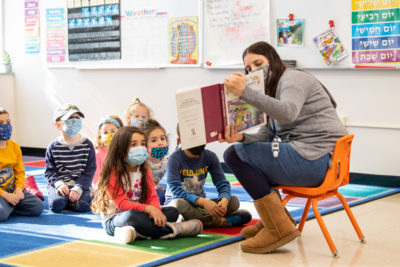
Revised August 2022
When I started working in government relations and advocacy more than a decade ago, people would ask if I was a lobbyist, and the answer was, and still is, yes.
That word tends to have such a complicated connotation, but lobbying is a constitutionally given right. The 1st Amendment gives us “the right to petition the Government for a redress of grievances.” While subjects like funding for older adult services and early childhood centers might not be seen as a grievance, I see my role as an advocate as someone who helps ensure that government is working effectively for everyone.
With more than a decade of experience in government and advocacy, I joined our Federation at the end of October 2021. Within my first few weeks, I heard that transportation for the more than 2,000 students who attend one of the four Jewish day schools in Greater MetroWest was a sector on the verge of crises. We have four vibrant schools in our community: Golda Och Academy in West Orange (Essex), Jewish Education Center (JEC) in Elizabeth (Union), Joseph Kushner Hebrew Academy/Rae Kushner Yeshiva High School in Livingston (Essex), and Gottesman RTW Academy in Randolph (Morris). Our Federation has been supporting our schools for years and, more recently, decided to invest in an advocate to address their specific needs while having connections to and knowledge of the local community.
Reliable transportation is part of the foundation of the success of any school and is often the only way that both parents can hold employment outside of the home. Now, with my work at Federation, we are investing in reliable transportation on a legislative and advocacy level.
Until this year, New Jersey allocated $1,000 per pupil to fund a bus for nonpublic school students, provided they meet minimum and maximum distance requirements. The school district, or a designated company they contract with, uses these funds to solicit bids from bus companies. It is increasingly challenging to find bus companies that are willing to respond to the bids at the current rate. There is a gap of around $20,000 per bus between what this funding provides and the actual cost of providing the service. Two years of COVID combined with a school bus driver shortage means that hundreds of families are feeling the impact of unreliable transportation on any given week.
Together with representatives from the four day schools, Federation developed an advocacy strategy. The first step of any strategy is developing your “ask.” What do we need from government to meaningfully address the problem? Since the per pupil allocation had not been adjusted in years, we started there and decided to ask for an increase in this amount to $1,500. We calculated that this was the amount that was needed to properly cover the actual cost of providing the service and ensure competitive wages for the workforce.
After developing this ask, we started meeting with our colleagues in government to explain the challenge and communicate the urgency. We met with local elected officials, members of Governor Murphy’s administration, and the Treasury Department. We also delivered testimony before the Assembly and Senate budget committees. And we placed an op-ed co-authored by parents at all four schools about the transportation challenges.
I am so thrilled that our advocacy efforts were successful. The State budget was finalized at the end of June and included historic investments for the nonpublic school community. Most notably, the State increased the investment for transportation from $1,000 per student to $1,022 per student. Though this might seem like a modest increase, it afforded the schools and districts additional funding to be competitive with the bidding process. The State also invested in compensatory education, raising the amount per student from $995 to $1,015, and for security from $175 to $205 per student.
As we go back to school over the next couple of weeks, we want to express our gratitude to our colleagues in government for their investment in these critical services. Wishing everyone a happy, safe, and meaningful school year!

